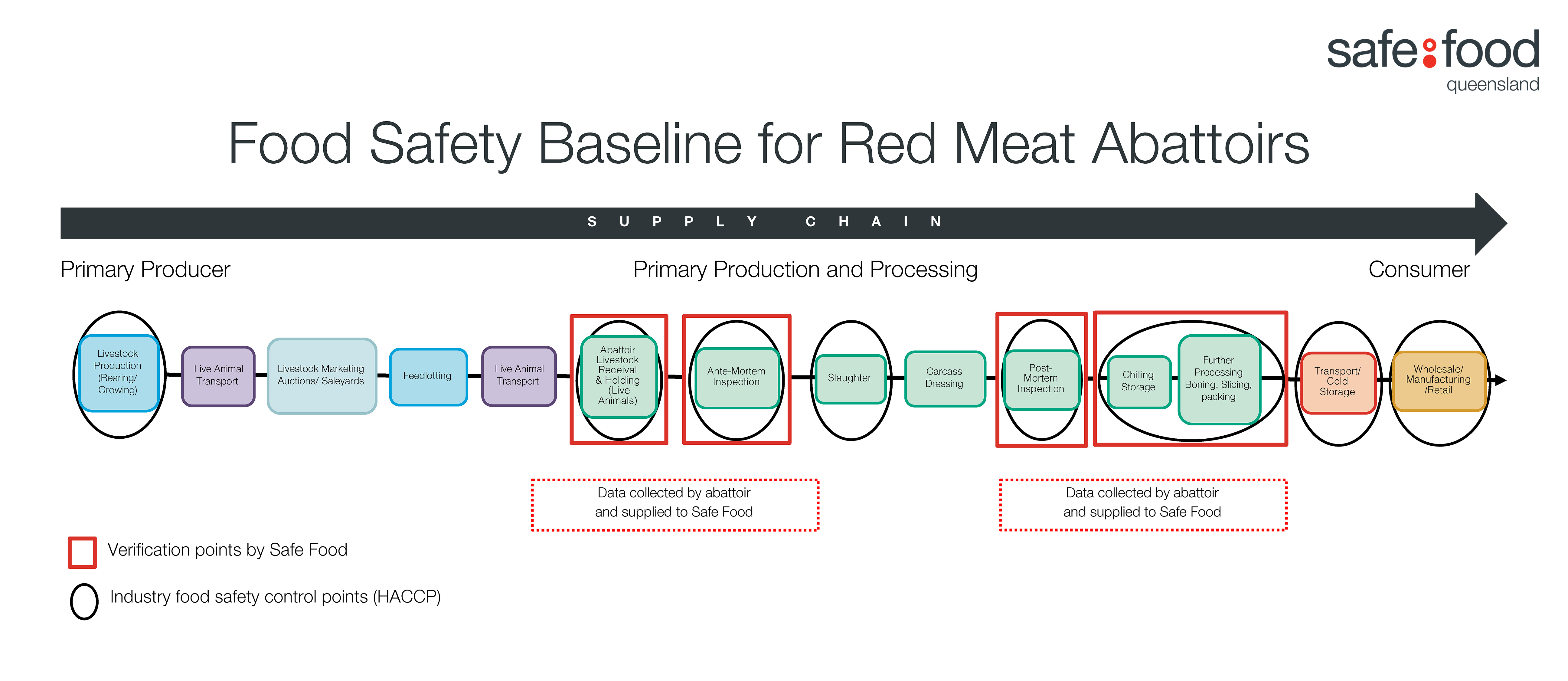-
Our Approach
-
Regulation in Queensland
-
Regulation in Australia
-
National Standards
Legislation + Regulation
-
Our Approach
Managing food safety risks is a shared responsibility between consumers, food businesses, industry and government. Controlling these risks during primary production and processing is the responsibility of the food business, while Safe Food has a responsibility to verify compliance with legislation.
Over the past decade, Safe Food has worked in collaboration with food industry sectors to develop Safe Food Baselines. These Baselines form the foundation of our modernised approach to food safety regulation, which is built on continuous engagement with industry. This promotes industry best practice throughout the food supply chain and applies a systems-based approach to regulation. Our approach places more responsibility on food businesses to engage with Safe Food and share information in a timely manner, which Safe Food uses to monitor compliance. The two-way, proactive flow of information between Safe Food and businesses is an important feature of our compliance model, which continues to develop as knowledge and experiences are shared and behaviours are modified.
Safe Food Baselines
Today’s supply chains can be lengthy and complex. Producing a single product may involve various inputs (e.g. ingredients), interventions (e.g. cooking), and monitoring actions (e.g. inspections). Safe Food Baselines show where industry has agreed to targeted food safety interventions to produce a stable and consistent food production system. Safe Food can monitor deviations and ensure businesses take adequate action and response.
A unique aspect to the development of Safe Food Baselines is that industry identifies specific points along the supply chain where information is uniformly collected that can, when considered together, give an indication of the stability of the food production system and whether it is performing as expected. This information is used to track performance against industry-agreed targets and allows for benchmarking performance over time. Reports and alerts are provided as feedback to individual businesses if their performance has not met industry-agreed targets, enabling the business to review and remedy the situation before a food safety event arises. This preventive approach to food safety regulation allows food businesses to focus attention, resources and effort in areas that deliver desired food safety outcomes. It also provides an opportunity for Safe Food to pre-emptively engage with individual businesses and industry to discuss trends and areas for improvement.
The design and refinement of Safe Food Baselines is dependent on authentic engagement between Safe Food and food businesses including ongoing dialogue, a deep understanding of the industry and direct consultation. Scientific research, industry knowledge and practice and other sources of evidence aid in the continual validation of the model. This ensures that each Safe Food Baseline is designed, implemented and monitored with ownership shared between Safe Food and industry.
The use of Safe Food Baselines within our compliance model offers an efficient and proactive approach to managing risks. Most importantly, consumers can have confidence that businesses are able to consistently produce safe food by conforming to a set of science- and risk-based performance criteria. Through the development and refinement of Safe Food Baselines, Safe Food and food businesses have developed a collaborative, risk-based approach to managing food safety that drives systems-wide improvements and trust.
Example of Safe Food Baseline for the Red Meat Supply Chain:

-
Regulation in Queensland
Each state and territory has adopted a different approach to achieving consistent food safety outcomes. Queensland has adopted a virtual food safety agency approach, whereby three government agencies work together to regulate food safety:
- Safe Food Production Queensland
- Queensland Health
- Department of Agriculture and Fisheries
The day-to-day regulation of primary production and processing is the responsibility of Safe Food. The legislation focuses on the food safety management of meat, eggs, dairy, seafood and horticulture. It also provides a framework to address emerging issues that may impact food safety.
Useful resources:
Food Production (Safety) Regulation 2014
Food Production (Safety) Act 2000
Acts Interpretation Act 1954 (for calculation of fees)
-
Regulation in Australia
Australia has high standards of food safety. Its food safety regulation system is designed to protect consumers and promote good food safety practices.
A collection of agencies work together to ensure that food consumed in Australia is safe.
Food regulation is aimed at achieving predetermined food safety outcomes, regulated at a national, state and local level.
Useful Websites:
-
National Standards
The aim is to ensure consumers continue to have the highest confidence in the safety of the food they consume, but at the same time do this in a way that minimises the impost on food businesses.
It is considered important that managing food safety focuses on points in the food chain where hazards are introduced, rather than relying on solving a problem at the end of the process. This through-chain preventive approach to food safety ensures that Australia addresses risks to public health in the food supply, builds consumer confidence, safeguards international trade in food and, in time, improves levels of food safety for the consumer.
FSANZ works in partnership with other agencies of Australian governments, industry stakeholders and consumer groups in the development of primary production and processing standards, particularly through Standard Development Committees established for each primary sector.
Primary production and processing standards have been developed for:
- Egg industry
- Seafood industry
- Dairy industry
- Meat industry
- Poultry meat industry
- Horticulture (seed sprouts) industry
- Horticulture (leafy vegetables) industry – effective from February 2025
- Horticulture (melons) industry – effective from February 2025
- Horticulture (berries) industry – effective from February 2025
For information on national food standards, visit the FSANZ website.
